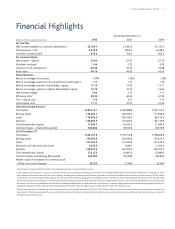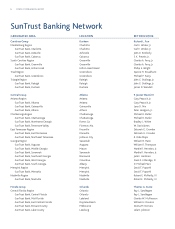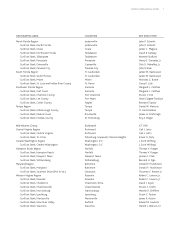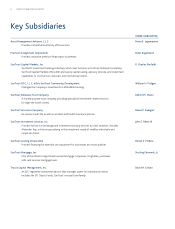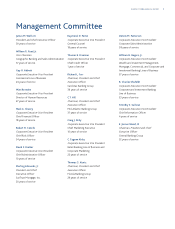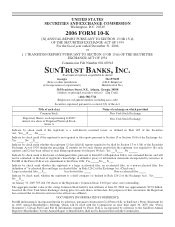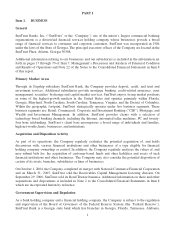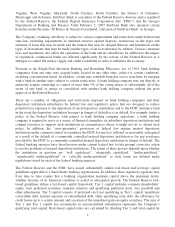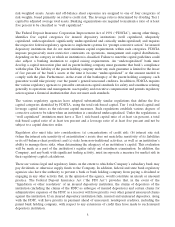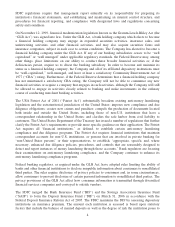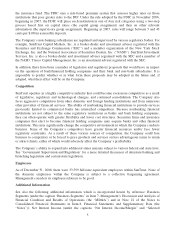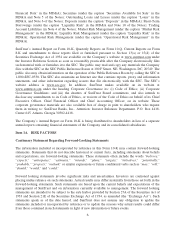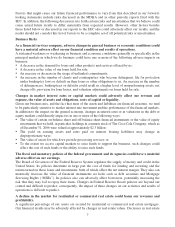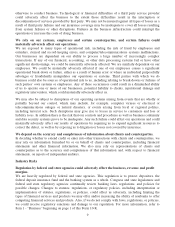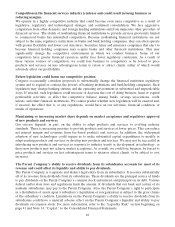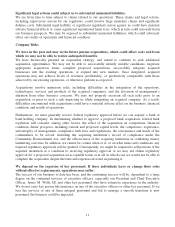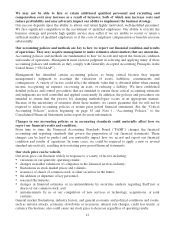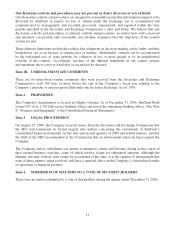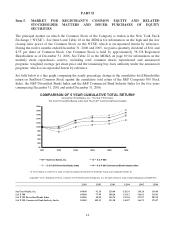SunTrust 2006 Annual Report Download - page 17
Download and view the complete annual report
Please find page 17 of the 2006 SunTrust annual report below. You can navigate through the pages in the report by either clicking on the pages listed below, or by using the keyword search tool below to find specific information within the annual report.FDIC regulations require that management report annually on its responsibility for preparing its
institution’s financial statements, and establishing and maintaining an internal control structure, and
procedures for financial reporting, and compliance with designated laws and regulations concerning
safety and soundness.
On November 12, 1999, financial modernization legislation known as the Gramm-Leach-Bliley Act (the
“GLB Act”) was signed into law. Under the GLB Act, a bank holding company which elects to become
a financial holding company may engage in expanded securities activities, insurance sales, and
underwriting activities, and other financial activities, and may also acquire securities firms and
insurance companies, subject in each case to certain conditions. The Company has elected to become a
financial holding company under the GLB Act. If any of our banking subsidiaries ceases to be “well
capitalized” or “well managed” under applicable regulatory standards, the Federal Reserve may, among
other things, place limitations on our ability to conduct these broader financial activities or, if the
deficiencies persist, require us to divest the banking subsidiary. In order to become and maintain its
status as a financial holding company, the Company and all of its affiliated depository institutions must
be “well-capitalized,” well-managed, and have at least a satisfactory Community Reinvestment Act of
1977 (“CRA”) rating. Furthermore, if the Federal Reserve determines that a financial holding company
has not maintained a satisfactory CRA rating, the Company will not be able to commence any new
financial activities or acquire a company that engages in such activities, although the Company will still
be allowed to engage in activities closely related to banking and make investments in the ordinary
course of conducting merchant banking activities.
The USA Patriot Act of 2001 (“Patriot Act”) substantially broadens existing anti-money laundering
legislation and the extraterritorial jurisdiction of the United States; imposes new compliance and due
diligence obligations; creates new crimes and penalties; compels the production of documents located
both inside and outside the United States, including those of non-U.S. institutions that have a
correspondent relationship in the United States; and clarifies the safe harbor from civil liability to
customers. The United States Department of the Treasury has issued a number of regulations that further
clarify the Patriot Act’s requirements or provide more specific guidance on their application. The Patriot
Act requires all “financial institutions,” as defined, to establish certain anti-money laundering
compliance and due diligence programs. The Patriot Act requires financial institutions that maintain
correspondent accounts for non-U.S. institutions, or persons that are involved in private banking for
“non-United States persons” or their representatives, to establish, “appropriate, specific and, where
necessary, enhanced due diligence policies, procedures, and controls that are reasonably designed to
detect and report instances of money laundering through those accounts.” Bank regulators are focusing
their examinations on anti-money laundering compliance, and the Company continues to enhance its
anti-money laundering compliance programs.
Federal banking regulators, as required under the GLB Act, have adopted rules limiting the ability of
banks and other financial institutions to disclose nonpublic information about consumers to nonaffiliated
third parties. The rules require disclosure of privacy policies to consumers and, in some circumstances,
allow consumers to prevent disclosure of certain personal information to nonaffiliated third parties. The
privacy provisions of the GLB Act affect how consumer information is transmitted through diversified
financial services companies and conveyed to outside vendors.
The FDIC merged the Bank Insurance Fund (“BIF”) and the Savings Association Insurance Fund
(“SAIF”) to form the Deposit Insurance Fund (“DIF”) on March 31, 2006 in accordance with the
Federal Deposit Insurance Reform Act of 2005. The FDIC maintains the DIF by assessing depository
institutions an insurance premium. The amount each institution is assessed is based upon statutory
factors that include the balance of insured deposits as well as the degree of risk the institution poses to
4


